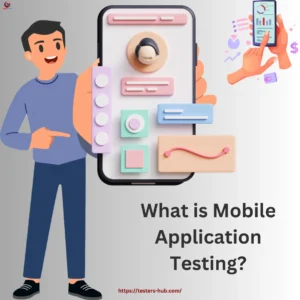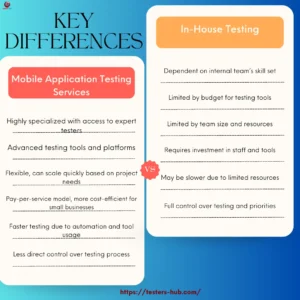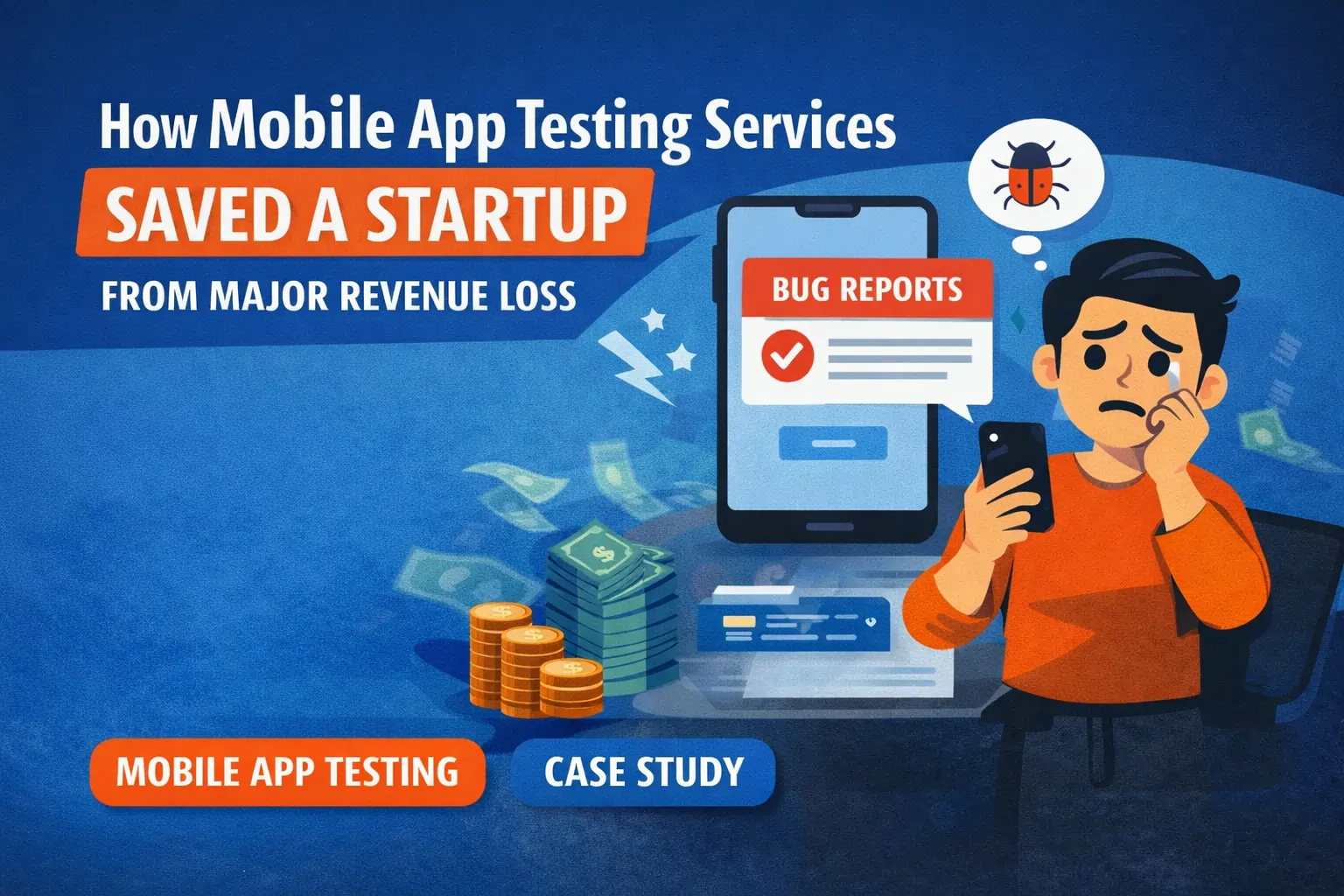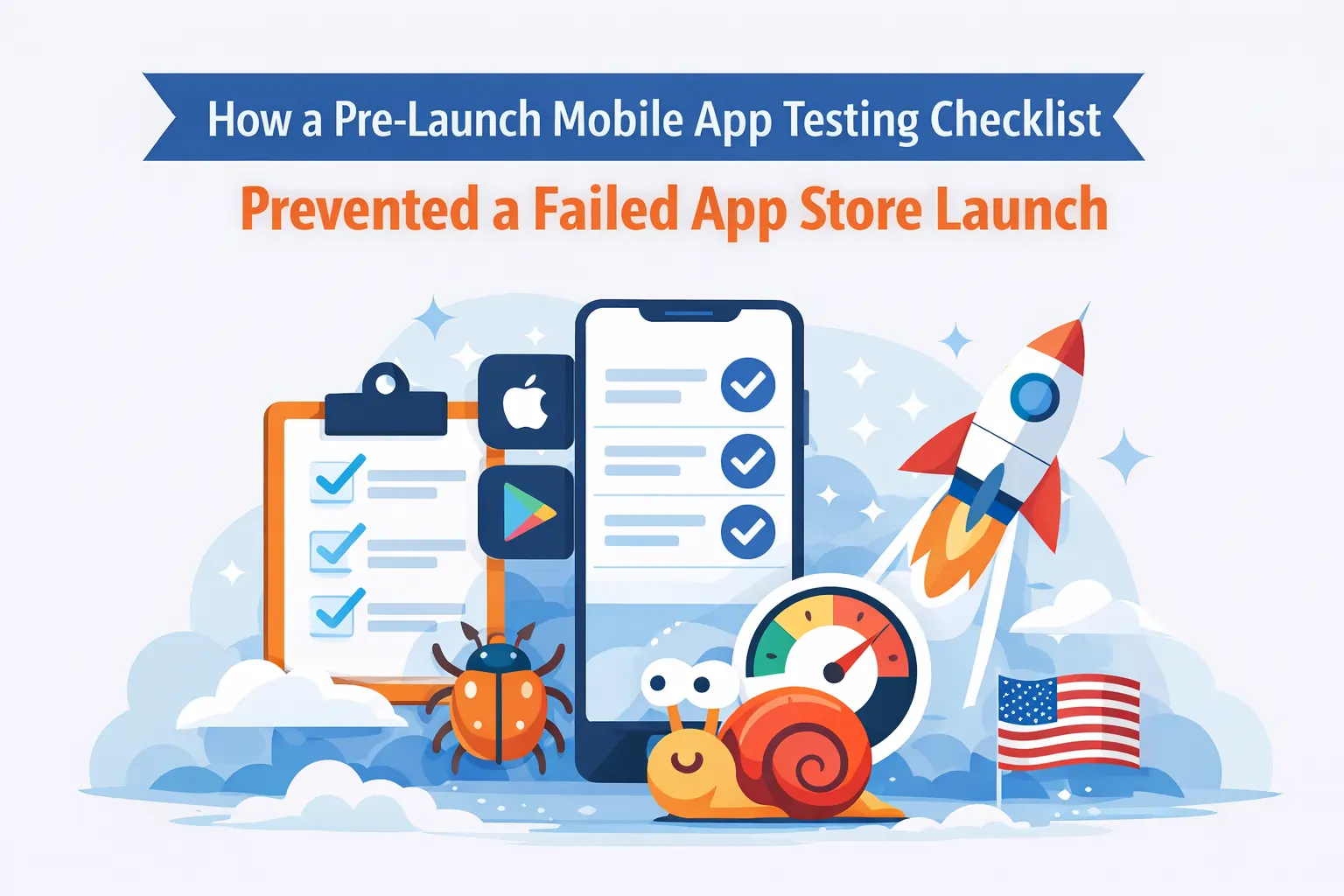Mobile Application Testing Services vs. In-House Testing: What’s the Best Option?
Mobile application testing services are critical for ensuring your app performs optimally across different devices and platforms. These services focus on testing various aspects of the app, including functionality, performance, security, and user experience, to detect and fix any issues before the app is released.
By utilizing mobile application testing services, businesses can tap into specialized expertise and the latest tools, resulting in a more efficient testing process. For any business aiming to deliver a top-notch user experience, mobile application testing services are indispensable to ensure app success.
What is Mobile Application Testing?
Before we compare outsourcing and in-house testing, it’s important to understand the fundamentals of mobile application testing and why it’s essential for the success of any app.
Mobile app testing ensures that an application functions as intended by assessing its performance, security, usability, and also overall functionality. This process includes testing the app’s compatibility with different operating systems like iOS and Android, as well as evaluating its performance across a range of devices and varying network conditions.
Mobile app testing consists of several key techniques designed to ensure the app works correctly and provides an optimal user experience:
- Functional Testing: Verifies that the app’s essential features, such as navigation, buttons, and also forms, function as intended and support the app’s primary tasks.
- Usability Testing: Focuses on evaluating the user interface (UI) and user experience (UX) to ensure the app is intuitive, easy to navigate, and delivers a smooth experience.
- Performance Testing: Assesses how the app performs under various conditions, such as high traffic or low network connectivity, to ensure it remains responsive and stable.
- Security Testing: Identifies any security vulnerabilities that could potentially jeopardize user data or allow unauthorized access to the app.
- Compatibility Testing: Ensures the app works seamlessly across different devices, operating systems, screen sizes, and browsers, delivering a consistent experience.
- Automation Testing: Uses automated testing tools to efficiently perform repetitive tests, which is especially useful when testing across multiple devices or environments.
These testing methods can be done either manually or with automation, ensuring that the app meets high standards for functionality, security, and user experience across different platforms.
The Advantages of Mobile Application Testing Services
Many businesses opt to outsource their app testing to specialized mobile app testing companies that have extensive experience and access to advanced testing tools. Mobile application testing services typically offer a range of testing options, from functional and usability testing to performance and security evaluations.
1. Expert Knowledge and Experience
Mobile application testing companies have teams of experienced testers who specialize in testing mobile apps across various platforms, devices, and network conditions. These testers are well-versed in mobile automation testing and use industry-standard tools to identify bugs and inefficiencies that could harm the user experience.
By partnering with a testing service, your business gains access to their expert knowledge without having to invest in hiring and training internal testers. These professionals understand the latest trends in mobile app testing, including emerging challenges related to mobile performance, security, and usability.
2. Access to Advanced Testing Tools and Platforms
One of the primary advantages of outsourcing mobile app testing is the access to sophisticated testing tools and platforms. Leading mobile app testing platforms can help you simulate user actions, test the app’s response across a variety of devices, and assess its performance under different conditions.
Automated testing is another key benefit of mobile application testing services. Automated tests allow for faster, more accurate testing, particularly for repetitive tests across multiple devices. Tools such as Selenium, Appium, and others can streamline the testing process, reducing human error and the time required for quality assurance.
These tools help run tests that cover a broad range of devices, screen sizes, operating systems, and network conditions. As a result, your app is thoroughly vetted for any issues that might arise in real-world use.
3. Cost-Effectiveness
For many businesses, particularly smaller and also mid-sized ones, outsourcing mobile app testing is often more cost-effective than building and maintaining an in-house testing team. By outsourcing, companies only incur costs for the testing services they need, when they need them. This is especially beneficial for businesses with occasional testing needs or those that require additional resources temporarily, such as during a major update or feature launch.
In contrast, managing an in-house team comes with ongoing expenses like salaries, benefits, training, and the purchase of testing tools and also infrastructure. Outsourcing mobile app testing allows businesses to avoid these continuous costs, making it a more affordable and efficient solution compared to hiring full-time testers and investing in expensive software.
4. Faster Time to Market
Time is critical in the world of mobile apps. Delayed launches can result in lost opportunities and lower user acquisition. Mobile app testing companies can execute tests quickly and efficiently, using both manual and automated testing strategies. Automated testing tools, in particular, speed up the process by running tests simultaneously across multiple devices, ensuring that your app gets the feedback it needs to reach production faster.
With an experienced testing team, your app undergoes rapid testing and debugging, allowing you to release updates and fixes with confidence. This quicker feedback loop is crucial for businesses looking to stay ahead of competitors and maintain high-quality standards.
5. Scalability
A significant advantage of mobile app testing services is their ability to scale alongside your app’s growth. As your app adds new features or becomes more complex, you can easily expand your testing efforts by partnering with the testing service to perform more in-depth evaluations. For example, when you release a new update or feature, the testing service can quickly adjust its approach to ensure everything functions as expected.
In contrast, scaling an in-house testing team may require additional hiring, purchasing more testing tools, and providing ongoing training. Outsourcing mobile app testing removes these hurdles, providing a more flexible and cost-effective way to scale your testing efforts as your app continues to evolve.
The Advantages of In-House Testing
While many businesses prefer outsourcing mobile app testing, there are situations where in-house testing may be the better option. In-house testing gives companies complete control over the testing process, and also it can be a good fit for smaller teams or those with specialized needs.
1. Greater Control
When testing is done in-house, you have full control over the testing process. In-house testers work directly with developers and product managers, which can lead to quicker communication and faster turnaround times. This close collaboration ensures that the app is tested according to the specific goals and priorities of the business, with immediate feedback.
In-house teams are often better positioned to prioritize issues that need immediate attention. For example, if a critical bug is found, an in-house team can jump in and fix it right away, without having to go through the external vendor’s workflow.
Deep Understanding of the Product
An in-house testing team has extensive knowledge of the app’s development, features, and objectives, which can help them identify issues that may not be immediately visible to an external testing service.
For instance, in usability testing, internal testers can provide valuable insights due to their familiarity with the app’s overall vision and user goals. This insight can help uncover potential usability problems or suggest improvements that might be missed by external testers who lack this detailed context.
Flexibility in the Testing Process
With an in-house team, you can fully customize the testing process to suit your app’s needs. You have the option to prioritize manual testing for specific app features or rely on mobile automation testing for repetitive tasks. In-house teams are also able to adjust their testing strategies quickly as new features are added or as the app evolves.
Moreover, in-house testers are often more responsive to changing priorities, such as design updates or shifting deadlines. This flexibility enables quicker adjustments and more responsive decision-making, keeping the testing process aligned with the app’s development.
4. Close Collaboration with Development Teams
In-house testers collaborate closely with the development team, which often leads to more efficient workflows and quicker resolution of issues. This direct interaction allows for immediate feedback, enabling developers to address problems as they arise, rather than waiting for reports from external testing providers.
Although mobile app testing services can deliver thorough reports, an in-house team typically has better communication with the development team, making the process of identifying and also fixing bugs or implementing new features smoother and faster. This close-knit collaboration helps streamline the development and also a testing cycle.
Challenges of In-House Testing
- Cost of Resources: Establishing an in-house testing team requires hiring skilled testers, investing in testing tools, and providing ongoing training. The costs of setting up and maintaining an internal team can add up quickly.
- Limited Expertise: Internal teams may not have the specialized knowledge of mobile app testing companies that work across multiple industries and types of apps. However, This could result in overlooked issues or inefficiencies.
- Resource Constraints: In-house teams may be limited in terms of capacity and may struggle to keep up with the increasing complexity of modern mobile apps.
Case Study: Mobile App Testing Services in Action
Case Study 1: E-commerce Mobile App for Global Retailers
Company: A prominent international e-commerce retailer
Challenge: The company encountered frequent app crashes and performance issues across various mobile devices and operating systems. Users also struggled with navigating the app, which led to decreased customer satisfaction and lower retention rates.
Solution: The company collaborated with a top-tier mobile app testing service to address these issues. A detailed testing strategy was put in place, emphasizing automated testing and usability testing on a wide range of devices, screen sizes, and operating systems. This comprehensive approach helped identify key performance issues and UI/UX challenges.
Result: Following the implementation of the testing team’s suggestions, the app experienced a 40% improvement in load times, a 25% reduction in crashes, and a 15% boost in user engagement.
Case Study 2: Healthcare Mobile Application
Company: A startup offering telemedicine services
Challenge: The startup’s mobile app was having compatibility issues on older Android devices, causing frustration for users in rural areas with limited access to newer phones.
Solution: The company worked with a mobile application testing service to conduct compatibility testing and performance testing on a wide range of devices. The testing service used advanced tools to simulate various network conditions and device configurations, uncovering issues that were specific to older hardware.
Result: After resolving compatibility issues, the app’s user base expanded significantly, especially in underserved regions. The app’s ratings in app stores improved, and the startup gained a reputation for reliability.
Mobile Application Testing Services vs. In-House Testing: A Comparison
Conclusion: Selecting the Right Testing Approach for Your Business
The decision to opt for mobile application testing services or in-house testing depends on several factors, also including the complexity of your app, your business objectives, and budget considerations.
If your app requires detailed testing, rapid delivery, and access to advanced testing tools, outsourcing to mobile app testing services could be the best route. These services provide scalability, specialized expertise, and the latest testing platforms, ensuring your app performs flawlessly in a competitive market.
On the other hand, if your app is smaller in scale, you prefer greater control over the testing process, and you have an experienced in-house team, managing testing internally could work well, particularly when closely collaborating with your development team.
For businesses that need top-notch expertise and cutting-edge tools, Testers Hub is a standout choice among mobile app testing companies. Their proficiency in both manual and automated testing ensures that your app delivers a smooth, reliable user experience across multiple devices and platforms.












